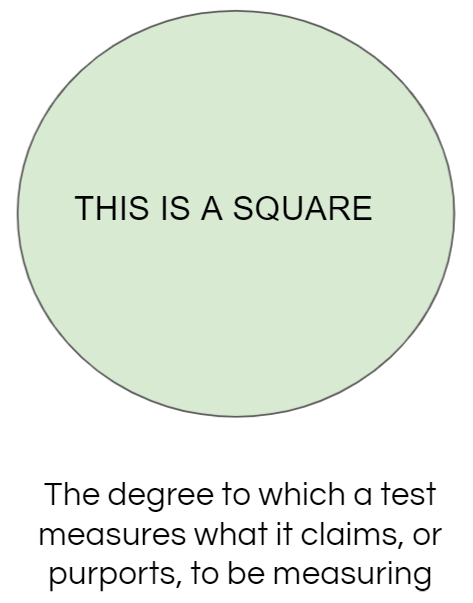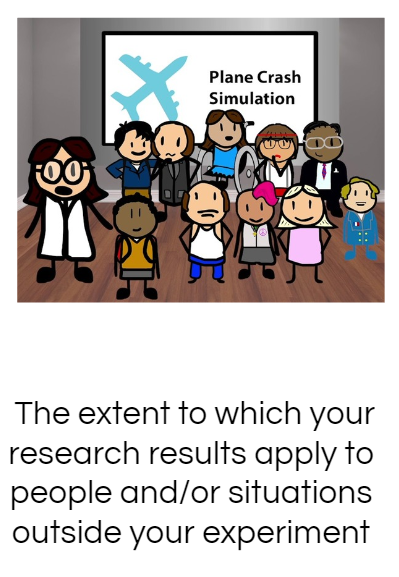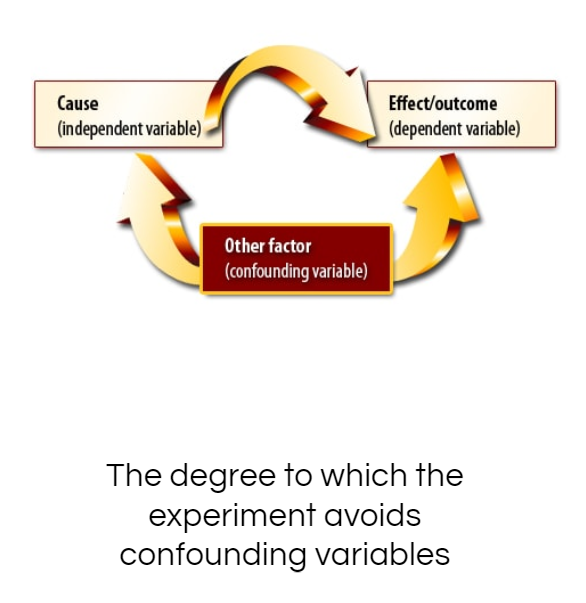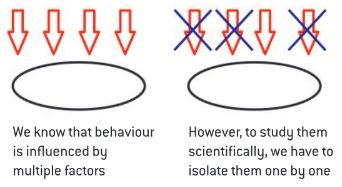Y12 Psych - Research Methodology
0.0(0)
Card Sorting
1/73
Earn XP
Description and Tags
Last updated 6:07 AM on 11/8/22
Name | Mastery | Learn | Test | Matching | Spaced | Call with Kai |
|---|
No analytics yet
Send a link to your students to track their progress
74 Terms
1
New cards
Psychology
The scientific study of behavior and mental processes
2
New cards
Quantitative
Expressed in numbers, more objective quantification
3
New cards
Qualitative
Expressed in words, more subjective but analysis is deep
4
New cards
Lab experiment
An experiment that takes place in a controlled environment where the researcher manipulates the IV and records the effect on the DV while maintaining strict control of extraneous variables
5
New cards
Lab experiment strengths
(Experiments) A standardized procedure ensures that experiments can be easily replicated, and reliability of findings & conclusions can be verified by peers
6
New cards
Lab experiment limitations
(Experiments) Often lacks ecological validity due to the artificial environments in which they are conducted
7
New cards
Field experiment
The researcher manipulates the IV and measures the DV, but conducts the experiment in a real-life setting rather than in a lab
8
New cards
Field experiment strengths
(Experiments) Has ecological validity because it is conducted in a real-life setting; can verify a cause and effect relationship
9
New cards
Field experiment limitations
(Experiments) Less control, not repeatable due to high chance of confounding variables, ethical issues (consent)
10
New cards
Quasi-experiment
An experiment in which investigators make use of control and experimental groups that already exist in the world at large, no independent variable is manipulated
11
New cards
Quasi-experiment strengths
(Experiments) Allows comparisons between types of people, useful to allow experimenters to investigate phenomena which may be impossible or unethical to investigate otherwise
12
New cards
Quasi-experiment limitations
(Experiments) No cause and effect relationship can be established, other variables could influence results
13
New cards
Natural experiment
Researchers find naturally occurring variables (not manipulable) and study them, a type of a quasi-experiment
14
New cards
Natural experiment strengths
(Experiments) Behavior is more likely to reflect real life because of its natural setting, higher ecological validity
15
New cards
Natural experiment limitations
(Experiments) No cause and effect relationship can be established, other variables could influence results, ethical issues if no consent is given before the experiment
16
New cards
Correlational Research
Investigates relationships between two variables (or more) without the researcher controlling or manipulating any of them. It's a non-experimental type of quantitative research
17
New cards
Correlation Coefficients (r)
Indicates the extent to which the variables are correlated, relationships can be positive, negative, or no correlation.
18
New cards
Correlational Research Strengths
(Research) Can help us understand complex relationships between many variables, often measured in real world settings, can help psychologists develop predictions to test in experiments
19
New cards
Correlational Research Limitations
(Research) Does not account for the 3rd variable problem meaning that the correlation does not mean causation
20
New cards
Third variable problem
The fact that a causal relationship between two variables cannot be inferred from the naturally occurring correlation between them because of the ever-present possibility of this term.
21
New cards
Bidirectional Ambiguity
When there is a correlational relationship between two variables, and there is uncertainty about which variable is influencing which.
22
New cards
Statistical Significance
A statistical statement of how likely it is that an obtained result occurred by chance
23
New cards
3 types of research design
Independent samples, matched pairs, repeated measures
24
New cards
Independent samples
A study where each participants only participates in one condition in either the control of experimental group (no one is used twice)
25
New cards
Matched Pairs
An independent study, except people are matched to a specific characteristic that might affect performance like age or gender. Allocation into the control or experimental group will still be random
26
New cards
Repeated Measures
A study where each of the participants will participate in both conditions keeping everything the same except for the condition tested.
27
New cards
Ethics
Moral principles that govern a person's behavior or the conducting of an activity
28
New cards
Informed Consent
An ethical principle that research participants be told enough to enable them to choose whether they wish to participate. If not possible, must be justified
29
New cards
Debriefing
The nature, purpose, results & conclusions of the research told to participants after a study
30
New cards
Protection from Harm
The right of research participants to be protected from physical or psychological harm
31
New cards
Deception
When the aim of a study must be withheld from participants, must be justified
32
New cards
Confidentiality
The researcher can connect the results to a particular participant, but the results are not made public
33
New cards
Anonymity
No one can trace the results back to a participant's identity
34
New cards
Right to withdraw
A participant's right to leave a study at any time and their ability to do so
35
New cards
Data fabrication
Researchers may intentionally or unintentionally publish fake results to support their theory
36
New cards
Plagiarism
Taking credit for someone else's writing or ideas
37
New cards
Publication credit
Authorship on a publication should accurately reflect the relative contributions of all the authors
38
New cards
Sharing Research for Data Verification
All data needs to be made available so it can be analyzed and, if possible, replicated. Must be shared but kept confidential
39
New cards
Sensitive personal information
Research into genetics or psychological disorders may reveal important information to participants, some of which participants may not want to know
40
New cards
Social Implications of Reporting Scientific Results
Research into many issues can impact society and public policy
41
New cards
Credibility
The extent to which the study can be trusted to reflect reality
42
New cards
Temporal Validity
The extent to which the study can be generalized over time
43
New cards
Random Sampling
Sampling from a population randomly. To assure that there is minimal bias it can be doing things like taking a name out of a hat
44
New cards
Random Sampling: Strengths
(Sampling) Ideal approach to making the population representative. Each member of the population has an equal chance of being part of the sample. With sufficient sample size, all characteristics are covered.
45
New cards
Random Sampling: Limitation
(Sampling) Time consuming, not very practical, uses lots of resources, can't be used twice
46
New cards
Stratified Sampling
Define the characteristics of the population and study the distribution of these characteristics. Gather the sample in those same proportions
47
New cards
Stratified Sampling: Strengths
(Sampling) Ensures the sample is inclusive/very representative of the population to the characteristics you chose. Allows you to control who will be studied
48
New cards
Stratified Sampling: Limitations
(Sampling) Difficult to accurately stratify, won't be enough people. Potential confounding variables. Some people drop out of the study which makes the proportions wrong. Some people may also withdraw their results. Requires knowledge of the characteristics of the target population
49
New cards
Convenience (Opportunity) Sampling
Recruiting people who are conveniently there to quickly get volunteers
50
New cards
Convenience Sampling: Strengths
(Sampling) Easy to access, fast, cheap, time efficient, useful when the characteristics of a sample are not relevant to the concept studied for example, memory
51
New cards
Convenience Sampling: Limitations
(Sampling) Often the sample is not diverse enough to generalize. Some of them might be familiar with the procedures and guess the aim of the study resulting in Demand Characteristics
52
New cards
Self Selected Sampling
Recruiting volunteers through mediums like adverts. This allows for quick recruitment and also a wide coverage as ads will probably reach a lot of people
53
New cards
Self Selected Sampling: Strengths
(Sampling) Quick easy way to recruit while having wide coverage
54
New cards
Self Selected Sampling Limitations
(Sampling) Lower population validity, demand characteristics might influence the results
55
New cards
Selection Bias
Occurs when the people who are research participants are selected in a way that does not make them representative of the population that the study wants the results to apply to
56
New cards
History Bias
Outside events that happened to the participants before the experiment. They present another unexpected variable into the equation which can skew the results. To prevent this all the conditions of both groups should be the exact same
57
New cards
Maturation Bias
When in the course of the experiment the participants go through natural developments like fatigue or growth. For example a training course over several months may yield results but it could also be because the people taking the results matured
58
New cards
Testing Effect Bias
First effect of the DV affects the second measurement. For example if you take the same test twice to test for change, the change might be due to the fact that you are more familiar with the format
59
New cards
Instrumentation Bias
When the measuring tool to measure the DV is slightly changed for example, when the observer is recording group 1 at breakfast then group 2 at lunch, the researcher may be more tired and miss something during lunch
60
New cards
Confirmation Bias
The tendency to process information by looking for, or interpreting, information that is consistent with one's existing beliefs
61
New cards
Regression to the mean
The fact that people on the extremes have a tendency to regress to the middle. For example if I choose people with high anxiety, they are more likely to become less anxious naturally than a normally anxious person because they are already at the "peak"
62
New cards
Experimental Mortality
When people drop out of experiments in a not random fashion. For example, if one group chooses to drop out due to the sensitive topics being asked it makes the groups unbalanced.
63
New cards
Demand Characteristics
When the participant understands the aim of the experiment and changes their behavior subconsciously to fit the interpretation. This can happen for many reasons including wanting to be seen as socially desirable or well liked

64
New cards
Experimenter Bias
When the researcher unintentionally influences participant behavior and results of experiment
65
New cards
4 Types of Validity of Generalization
Construct Validity, External Validity, Ecological Validity, Population Validity
66
New cards
Construct Validity
The quality of operationalization which is the process of trying to measure or quantify a construct. Ex. construct = aggression, operationalization = hours of watching violent TV. The more it is justifiable it is the higher the construct validity

67
New cards
External Validity
The extent to which you can generalize the findings of a study to other situations, people, settings and measures. Can you apply the findings of your study to a broader context? Includes generalizability and applicability.

68
New cards
Mundane Realism
Describes the degree to which the materials and procedures involved in an experiment are similar to events that occur in the real world. More about the PROCEDURE itself. PART OF EXTERNAL VALIDITY!
69
New cards
Ecological Validity
The extent to which the experiment can represent a realistic setting or can be applied to real life. More about the ENVIRONMENT the study takes place in. PART OF EXTERNAL VALIDITY!
70
New cards
Population Validity
The extent to which findings can be generalized to a larger population. Unquantifiable by objective standards. PART OF EXTERNAL VALIDITY!
71
New cards
Internal Validity
The degree of confidence that the causal relationship being tested is trustworthy and not influenced by other factors or variables

72
New cards
Holism vs. Reductionism
View the big picture vs. divide explanations into parts

73
New cards
Holism
Gain understanding of the whole in all its complexity: claims that the whole is bigger than the sum of its parts vs. explain a complex phenomenon by its constituent parts. It may be understood as reducing the whole to its parts
74
New cards
Reductionism
The principle that the whole can be best understood by examining its parts individually